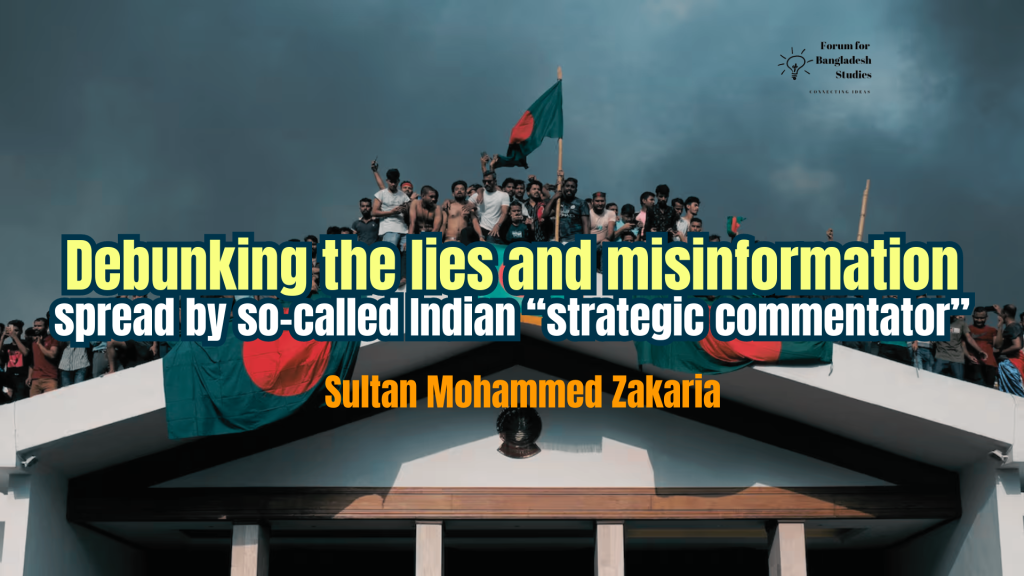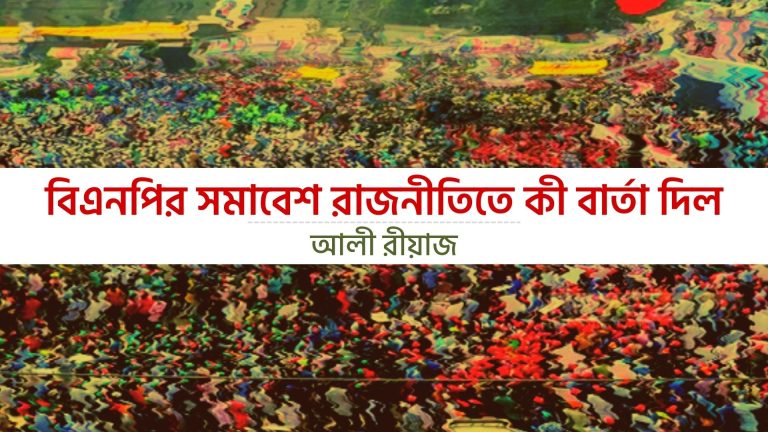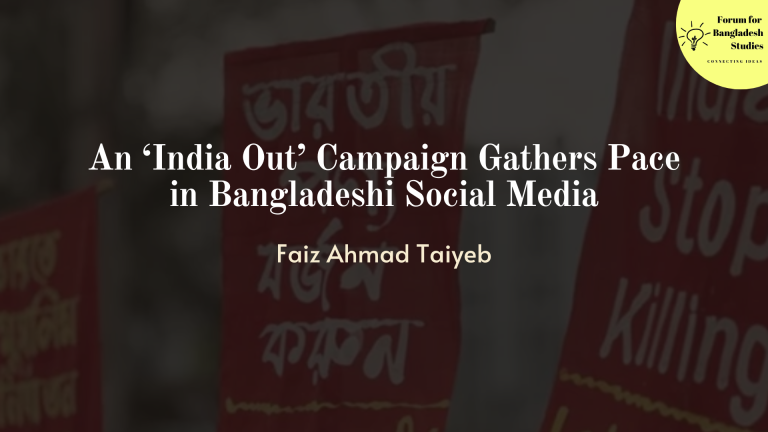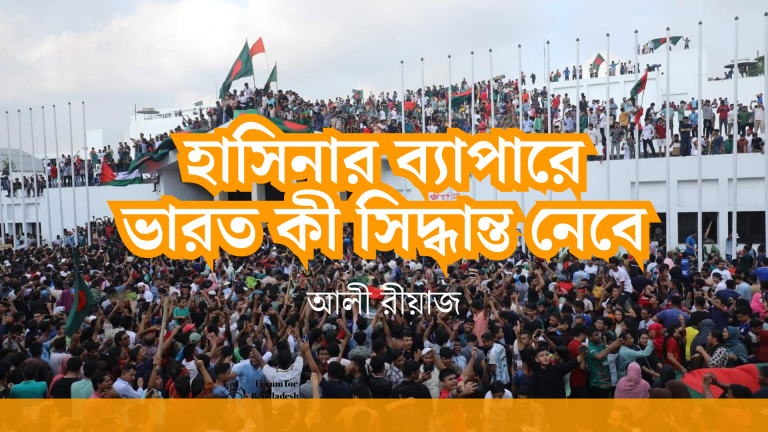In an opinion piece at The Hill on Bangladesh’s recent political change titled A quiet military coup in Bangladesh, Indian geopolitical commentator Brahma Chellaney makes several inaccurate, faulty claims. Let’s unpack his lies and misinformation.
Chellany: “In reality, the regime change in the world’s eighth most-populous country amounts to a quiet military coup behind a civilian facade.”
Fact: Completely wrong. The military chief and top brass tried to protect Sheikh Hasina as long as possible. According to a military officer, on July 20th, the military received a “shoot to kill” order from the military leadership against protesters during a special meeting held in the Army Command Post at the underground bunker of Bangladesh Army Headquarters. On July 21st, forces affiliated with the 9th Division of the military were accused of firing thousands of bullets at protesters in Narayanganj, resulting in numerous casualties. Dozens of videos available on social media (link here) show the military actively and indiscriminately shooting at protesters. Additionally, military personnel seconded to the Rapid Action Battalion and Border Guard Bangladesh actively took part in shooting and killing protesters, even using UN-marked helicopters.
After its initial attempt to follow Sheikh Hasina’s unlawful order to violently suppress the protesters, significant pushback emerged within the military ranks, with many junior and mid-ranked officers refusing to shoot their own people. Realizing the growing dissent within the force, the military senior leadership decided to disengage. Therefore, your claim of a military-led coup is completely nonsense, detached from reality and demonstrates a troubling lack of understanding of the situation. (Please see these videos of military shooting at protesters: Link 1)
Chellaney: “Its advisers work essentially at the direction of the military brass, especially the army chief, Gen. Waker-uz-Zaman, the power behind the throne.”
Fact: This is totally incorrect. After Sheikh Hasina fled the country, the military leadership initially considered Salah Uddin Ahmed as the Chief Advisor. However, it was the student leadership that led the movement that pressed for Professor Muhammad Yunus to lead the interim government. They first reached out to Yunus and convinced him to take the charge of the transition government.
The students even uncharacteristically unofficially announced the name of Chief Advisor in a press briefing days before even his name was confirmed by the military leadership. It seems you have not been adequately informed or are not closely following the events—this undermines your credibility as an analyst. (Please read more: Nobel laureate Muhammad Yunus to be chief adviser, say Bangladesh protesters.)
Chellaney: “Violent student-led, Islamist-backed protests against Hasina’s 15-year secular but increasingly undemocratic reign helped force her out of office.”
Fact: The protests were never violent until they were attacked by the regime goons. They were protesting peacefully until July 15, when Sheikh Hasina and her party secretary Obaidul Qader ordered its student wing, Chhatro League, to attack the protesters, which escalated into widespread anger.
You have been deliberating mischaracterizing the protests, which undermines your accurate understanding of the situation. (Please read more: BCL unleashes fury on quota protesters. Also read: Chhatra League: Quota protesters attacked DU students who refused to join rallies)
Chellaney: “Driving Hasina into exile appears not to have been a spur-of-the-moment military decision but rather central to a well-thought-out plan for an indirect army takeover.”
Fact: This is an audacious claim, made with great authority! However, Mr. Chellaney provides no supporting evidence or additional insights to explain why he holds this view. Without substantiation, it remains an “uninformed” opinion, not informed analysis.
Chellaney: “Bangladesh’s cycle of political violence began with the predawn murder of Hasina’s father, Sheikh Mujibur Rahman, in a 1975 army coup.”
Fact: Political violence in Bangladesh predates much before the 1975 coup. Between 1972-75, Sheikh Mujibur Rahman led a violent crackdown on opposition activists, with his paramilitary force, Rakkhi Bahini, reportedly killing thousands. (Please read more: Flying Blind: Waiting for a Real Reckoning on 1971.)
Chellaney: “Bangladesh has no regional adversary, yet it maintains a relatively large military.”
Fact: The Bangladesh-India border has been one of the deadliest in the world with BSF indiscriminately killing Bangladeshis across the border. At least 1,236 Bangladeshis were killed and 1,145 injured in shootings by the Indian border force between 2000 and 2020.
What kind of friendly, peaceful neighbor kills its neighbor? Indian aggression and the senseless killing of Bangladeshis along the border have made it an adversary in practice. Moreover, India’s blatant interference in Bangladesh’s internal affairs—including deciding who can govern the country (as seen in their defense of Sheikh Hasina in the 2009, 2014, and 2018 elections) and who can invest in key projects like the Teesta project and the Sonadia deep seaport—positions India as an aggressor working against the interests of the Bangladeshi people.
Therefore, your notion that Bangladesh has no regional adversary is misleading. Unfortunately, India has become seen as an adversary and enemy by many Bangladeshis due to its deadly policies and complete disregard for Bangladeshi lives. (Please read more: Border killings by BSF rise despite repeated pledges. Also read: ‘1,000 killed in a decade along Bangladesh border’)
Dear Editorial Team, The Hill, Conducting a fact check on any piece is a vital part of due diligence that would only enhance your credibility.




